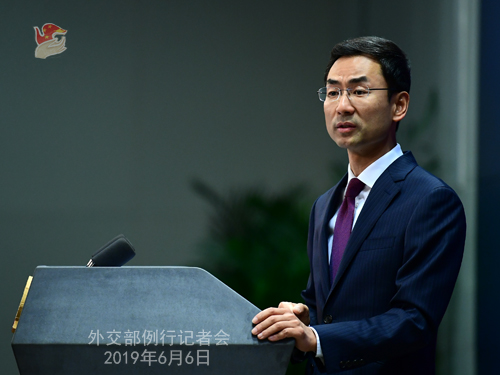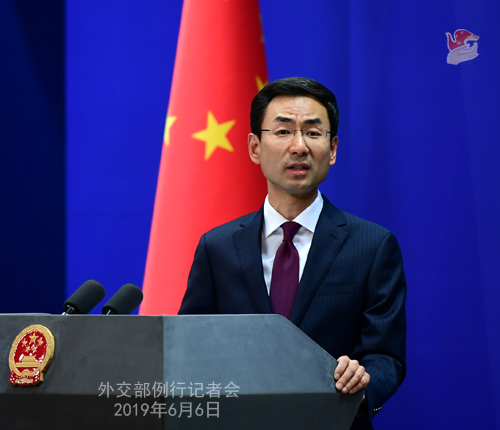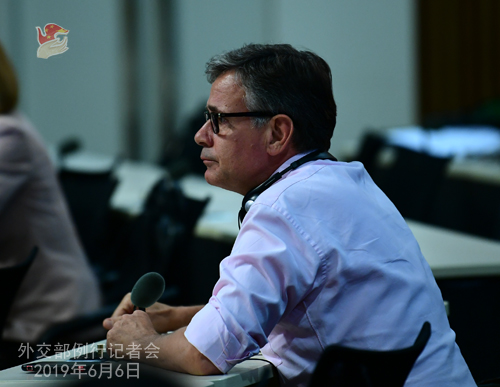| Foreign Ministry Spokesperson Geng Shuang's Regular Press Conference on June 6, 2019 |
| 2019-06-06 20:09 |
|
Q: It is reported that the US has plans to sell two billion dollars worth of weapons to Taiwan, including tanks and other weaponry. What's the foreign ministry's view on this and how would such an action affect ongoing trade negotiations? A: We note the relevant reports and express serious concerns on the moves of the US side. China firmly, consistently and unequivocally opposes US arms sales to Taiwan. We urge the US to fully realize the high degree of sensitivity and severe impact of this issue and honor its commitment to the one-China principle and the three China-US joint communiques. It needs to stop selling arms to or having military ties with Taiwan, handle Taiwan-related issues prudently and properly and avoid serious damage to bilateral relations and peace and stability across the Taiwan Strait. Regarding China-US trade frictions and consultations, China has issued two White Papers, offering a full and accurate elaboration on our position. I won't repeat them here, but I'd like to advise the US once again to grasp the situation, return to the right track and meet China halfway as soon as possible. Q: Yesterday in Moscow, President Xi and President Putin signed a joint statement on developing a comprehensive strategic partnership of coordination for a new era. I wonder if you could tell us why the two countries upgraded their relations? A: This year marks the 70th anniversary of the establishment of diplomatic ties between China and Russia. The past seven decades witnessed extraordinary development in China-Russia relations, which sets an example of good neighborliness and win-win cooperation. The world is undergoing major changes unseen in a century. Faced with growing instability and uncertainties, China and Russia, as major countries with global influence, shoulder special responsibilities for world peace and development. Against such a backdrop, the new positioning and enrichment of our bilateral relationship is of special significance, as it is an inheritance of historical traditions, a response to the call of the times, a choice made by our two countries and an aspiration shared by all. Standing at a new historical starting point, China and Russia will prioritize political, security and practical cooperation, cultural and people-to-people exchange and international coordination, advance and deepen comprehensive strategic coordination and open up a new era of higher-level bilateral relations. China and Russia will step up comprehensive strategic coordination and provide greater support to each other on issues concerning our respective core interests. We will make extra efforts to deepen the convergence of interests and create more synergy between the Belt and Road Initiative and the Eurasian Economic Union. We will work for greater affinity between our peoples and consolidate public support for enduring friendship. We will take on more responsibilities for multi-polarity and greater democracy in international relations, and jointly foster a new type of international relations and a community with a shared future for mankind. Under the strategic guidance of the two heads of state and with the concerted efforts of people in various sectors, we believe China-Russia relations will score more remarkable achievements in the new era. Q: During President Xi's visit to Russia, the two heads of state signed and issued a joint statement on strengthening contemporary strategic stability. Can you tell us the background and significance of this statement? A: The international security situation is complex and fluid, with growing instability and uncertainties in strategic security. A certain country has been seeking an absolute strategic edge in the military field by practicing unilateralism and undermining arms control and non-proliferation regimes, which has posed severe challenges to global strategic equilibrium and stability. On the other hand, however, peace, stability and development remains the pursuit of most countries. As permanent members of the UN Security Council, China and Russia have the duty and obligation to safeguard global strategic stability. By signing and issuing the joint statement on strengthening contemporary strategic stability, the two leaders elaborated on observations on the international security environment and global strategic stability, made clear their common position on major issues of security and arms control, stressed the importance of good major-country relations to addressing global strategic issues, and put forth concrete measures on strengthening strategic stability and upholding international mechanisms on arms control and non-proliferation. This statement bears a vital significance. It sends a strong message to the world on both countries' commitment to global strategic stability, multilateralism and international order, and charts the course for China and Russia to deepen strategic mutual trust and coordination. It demonstrates the fact that, as major responsible countries, what China and Russia plan to do meets the expectations of the world. In safeguarding global strategic stability, China and Russia are by no means pursuing selfish gains or repeating the outdated path of alliance against a third party. As major-country relations are crucial to global strategic stability, we hope all major countries will reject conflict and confrontation, live in harmony with mutual respect and win-win cooperation.
Q: Is China helping Saudi Arabia with its ballistic missile program? A: The Chinese government opposes the proliferation of weapons of mass destruction (WMDs) and their means of delivery. Following our domestic policies, laws and regulations on non-proliferation, we strictly restrict the export of missiles, their related items and technologies. As comprehensive strategic partners, China and Saudi Arabia maintain friendly cooperation in various fields, which includes arms trade. Our cooperation is not in violation of international law and does not involve proliferation of WMDs. Q: It is reported that China and the ROK resumed talks this week on President Xi's possible visit to the ROK. Sources say that he may visit the country before the G20 Osaka Summit. Can you share some information with us? A: I don't have anything to say about that. China and the ROK are close neighbors and important cooperation partners with good bilateral relations. China is ready to step up exchange with the ROK at various levels, consolidate mutual trust, deepen cooperation and work for more progress in bilateral ties. Q: The joint statement signed by Chinese and Russian presidents says that they need to strengthen cooperation because today the international situation faces really serious challenges. Considering that recently for Russia and China, the US is the main source of different kinds of challenges, have leaders of Russia and China discussed any steps to deal with the US and have they discussed possible meetings with US President Trump during the G20 Osaka Summit? A: Both China and Russia issued press releases on the talks between President Xi and President Putin yesterday, which you may refer to if you are interested. As permanent members of the UN Security Council and major countries with global influence, China and Russia have a bilateral relationship featuring great vitality and broad prospects. It does not target and is not constrained by any third party, and will not be altered by changes in the external environment. Under the strategic leadership of the two presidents, the China-Russia relationship is at its best in history. By signing the joint statement yesterday, the two presidents elevated our relations to a comprehensive strategic partnership of coordination for a new era. This, I believe, is a strategic choice made by both countries that serves the common interests of the international community. Faced with growing uncertainties, instability and rising unilateral, protectionist and bullying practices, China and Russia need to join hands to safeguard the international system with the UN at its core, the international order based on international law and the multilateral trading regime. By so doing, we will be able to contribute more stability and positive energy to the complex international landscape. As for your question on the leaders' meetings on the sidelines of the G20 Osaka Summit, I have no information for you at the moment. Q: The Ministry of Industry and Information Technology issued commercial licenses for 5G today amid speculations that the timing of this move may have something to do with the trade war between China and the US, as it will probably help with Huawei and ZTE's business. Why did the relevant Chinese authority issue the licenses for 5G at this particular time? How do you respond to the above-mentioned speculations? A: This morning the Ministry of Industry and Information Technology (MIIT) issued commercial licenses for 5G to four enterprises. A detailed readout has been released by the MIIT and you may refer to that. As far as I know, at the above-mentioned event, MIIT officials made it clear that following the issuing of 5G licenses, foreign businesses are welcome as always to participate in the Chinese 5G market for joint development and shared benefits in this area. China's concrete action speaks volumes about its will to further open up and safeguard the multilateral trading system and free trade, which are now challenged by unilateralism and protectionism.
|
 |
|


